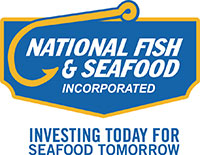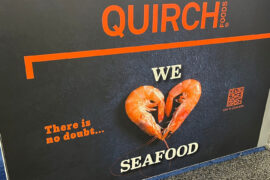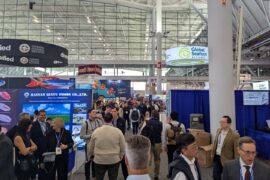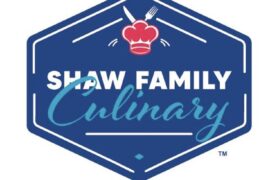National Fish & Seafood, a US-based division of the Pacific Andes Group, a fully integrated international seafood supplier that rang up $2.5 billion in business last year, has announced the launch of a project that enables small-scale shrimp farmers to have access to the highest international certification standards for sustainability. The program, which is designed to drive improvements in environmental protection, food security, biosecurity and traceability, was unveiled during the Global Aquaculture Alliance (GAA) GOAL 2014 conference in Ho Chi Minh City, Vietnam.
 “We passionately believe that aquaculture has the potential to feed a growing world population with a healthy and affordable source of protein,” said James Baros, the company’s aquaculture and sustainability coordinator. “We are developing a model that encourages all aquafarmers, especially small farmers, to improve culture methods to comply with rigorous environmental and social standards. This provides the opportunity to make healthy, safe, and sustainably raised seafood while providing job opportunities for millions of people in the developing world. A food production system that is truly sustainable environmentally, socially, and economically is a win-win for producers and consumers alike.”
“We passionately believe that aquaculture has the potential to feed a growing world population with a healthy and affordable source of protein,” said James Baros, the company’s aquaculture and sustainability coordinator. “We are developing a model that encourages all aquafarmers, especially small farmers, to improve culture methods to comply with rigorous environmental and social standards. This provides the opportunity to make healthy, safe, and sustainably raised seafood while providing job opportunities for millions of people in the developing world. A food production system that is truly sustainable environmentally, socially, and economically is a win-win for producers and consumers alike.”
As an industry leader in promoting seafood sustainability, a founding member of the non-profit GAA, and a co-host of the GOAL 2014 conference, National Fish & Seafood has worked together with the GAA to advance responsible aquaculture, and has witnessed first-hand the growth of GAA’s Best Aquaculture Practices (BAP) third-party certification program.
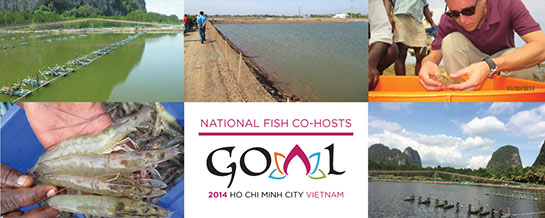
Today, the Gloucester, Massachusetts-based company is affiliated with more than 50 BAP-certified processing plants, spanning three species (shrimp, tilapia and Pangasius) and six countries (China, India, Indonesia, Malaysia, Thailand and Vietnam). The majority of the shrimp is sourced from farms contracted by National Fish & Seafood through partnerships with local processing plants, allowing the company to control production.
Since 2012, National Fish & Seafood has committed at a corporate level to sell only two, three- and four-star BAP shrimp. However, small family farmers can be marginalized in the sustainability movement.
“Small-scale farmers produce the majority of the world’s aquaculture products. If their production is excluded on the basis of an inability to meet and certify to international standards, then negative impact on the market will be tremendous,” said Jeff Sedacca, president of National Fish & Seafood’s shrimp division.
The company is collaborating with GAA and the Sustainable Fisheries Partnership (SFP) on a project to improve farming practices in order to bring small-scale shrimp farmers closer to BAP certification. With the support of GAA, National Fish & Seafood will pilot the first four groups of shrimp farmers – two in India, one in Vietnam and one in Indonesia – tapped to initiate the first Aquaculture Improvement Projects (AIPs) through SFP to document improvements in practices being made, and support a zonal management approach. The aim is to provide market access for more than 120 small-scale farmers.
“Educating and engaging small-scale farmers in sustainable practices and compliance with social responsibility are benefits for all of us,” continued Sedacca. “The purpose of our small farm group program is to address the biggest challenge, which is how to engage small farmers in responsible aquaculture, and make it possible for them to continue to participate in the marketplace.”
The company is also working with Farmforce to develop state-of-the-art technology for seafood traceability. The software is helping to change the game by using mobile technology to make traceability and compliance an integral part of small-scale farm production. The use of a mobile, cloud-based platform for tracking traceability on the farm presents a new and cutting-edge innovation that will give the company real time access to each farm’s activities.
About National Fish & Seafood
National Fish & Seafood is supplies seafood to major retailers, distributors, institutional food service and restaurant chains located across the United States. Every year it sources, processes and distributes more than 11,500 tons of frozen raw fish fillets and shrimp, cooked shrimp and breaded fish and seafood products under its National Fish, Matlaw’s and Schooner brands. The company maintains its own 66,000 square foot, SQF Level 3 certified processing facility located adjacent to its headquarters.

